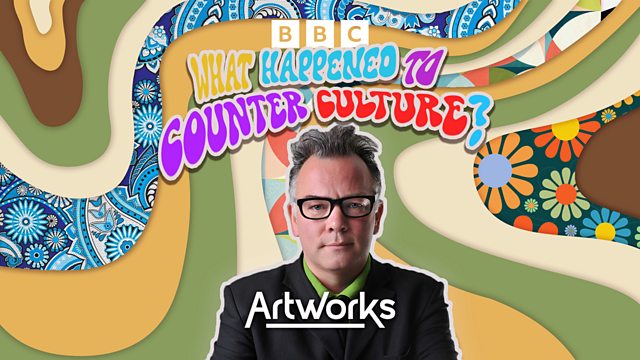2. Revolution in the Head
Comedian and author Stewart Lee explores the story and ideas of counter-culture since the end of the Second World War, and its more uncertain status in today's digital world.
More than just a cultural trend – counter-culture became a social movement so powerful it shaped institutions, businesses, politics and the attitudes and aspirations of whole generations – including everything from haircuts to voting choices. In fact, it became so prevalent that it’s sometimes hard to remember how things have changed under its influence.
Comedian Stewart Lee presents a five-part series exploring the evolution and key ideas that have driven counter-culture from its beginnings with the Beats, folk and jazz in the 1950s, to its heights in the 1960s and 70s including the hippies and the early tech-communalists, the new liberation movements and punk, to the 1980s and early 90s, where political power on both sides of the Atlantic pushed back against the values of the ‘permissive society’.
Talking to artists, musicians, writers, activists and historians, Stewart continues to the present day asking where we are now, in the digital age of social media silos and the so-called ‘culture wars’ – what’s happened to counter-culture? Was it co-opted, did it sell out? Or did its ideas of freedom and identity become so entrenched within mainstream culture it’s legacy has become unassailable? Or has it migrated politically to the Right? Throughout the series, the counter-culture is explored not only in terms of its history, extraordinary cultural output and key events – but also its deeper political and philosophical impact, its continued meaning for our own age.
Part 2: Revolution in the Head. Against the growing political turmoil of the 1960s, this episode looks at the growing counter-culture as first of all a revolution in the head - the changing ideas of freedom and liberation, the power of psychedelics and rock, all culminating in 1967’s Human Be-In and Summer of Love. In London, a network of underground presses, clubs and bookshops, happenings and events like the 14 Hour Technicolour Dream channel the underground in contrast to mainstream culture. But the lines between the counterculture and the mainstream are beginning to blur, as Bob Dylan's decision to 'plug in' at Newport is condemned by the folk scene as selling out, even as the new sound electrifies the underground. The Beatles in particular were a bridge between the ideas of the counter-culture and popular success. The years from 1966-7 especially are a golden age for the counter-culture, where many of its key ideas become entrenched – seemingly progressive, but later weaponised by its opponents. It championed a liberation of the individual against society, but to what ends?
Contributors include music producer Joe Boyd, songwriter and guitarist Johnny Marr, author Olivia Laing, founder of Rolling Stone magazine Jann Wenner, Woodstock photographer Lisa Law, founding member of Blondie and author Gary Lachman, stone carver Emily Young, historian Peter Oborne, journalist and writer John Harris, author Lynsey Hanley, musician and songwriter Robyn Hitchcock and David Cunningham, who writes on 20th century art movements.
Presenter: Stewart Lee
Producer: Simon Hollis
A Brook Lapping production for ÃÛÑ¿´«Ã½ Radio 4
Last on
Broadcasts
- Thu 14 Aug 2025 09:00ÃÛÑ¿´«Ã½ Radio 4
- Sun 17 Aug 2025 23:00ÃÛÑ¿´«Ã½ Radio 4

